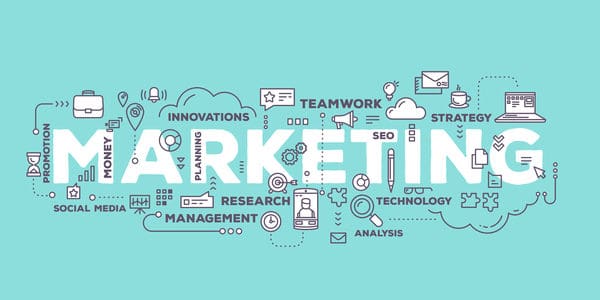It is hard to think about, hear about, or read about any business operations that don’t somehow involve marketing. It is a vital component for every company that buys or sells products, goods, or services. You may think marketing is advertising. Advertising is definitely a piece of the marketing process, but there is so much more to marketing than advertisements. What is it exactly? And, what is the first step to take in becoming a marketing professional? One of the first foundational steps towards a career in marketing begins with a Bachelor’s in Marketing degree. Let’s take a look.
What is Marketing?

Before we dig into the degree itself, we must understand what marketing is all about. We see marketing all around us every day. Sometimes, it surrounds you in ways you don’t even realize.
Companies develop products, goods, or services. They need to be able to promote their brand. Consumers make purchases. To make a profit, companies have to provide consumers with what they want or need and strategically advertise and promote their products or services.
Marketing encompasses every activity involved in identifying the target audience, listening to the customer, analyzing what they want, communicating that information to the company, advertising, creating, developing, and distributing proper promotional materials, selling, delivering products, maintaining relationships with customers, and networking.
Marketing is storytelling. Companies are telling stories and marketing their brand through our phones, televisions, Facebook, other social media accounts, emails, billboards, on the sides of vehicles, and even word of mouth.
History of Marketing
The idea, process, and purpose of marketing have evolved dramatically over the last 200+ years. Some believe we can trace the roots of marketing back to ancient China and India, as they had to persuade people to purchase their goods. Before the Industrial Revolution that began in the late 1700s, people relied on growing, making, and selling goods themselves. The Industrial Revolution consisted of significant innovation, where mass production, transportation, and mass media reporting led to a greater need for marketing.
Do you want to take a quick walk down history lane? Let’s do it and hit some essential marketing milestones that have occurred in the past 120 years along the way.
- The early 1900s – 1940s: Due to increased competition, marketing became a vital component in distribution and communication methods for companies to convince consumers what they had to offer was better than competing companies.
- The 1960s: Competition among companies was fierce. Direct marketing became a requirement, companies created marketing departments to focus on marketing, and executives looked to marketing managers for business operations input.
- The early 1990s: Branding was born. Companies saw that creating an easily identifiable brand that stands out from other products or services helps build a strong reputation and increases profits.
- The late 1990s: Internet marketing emerges due to the evolution of the web. Bristol-Myers Squibb, an American pharmaceutical company, was the “first company with an online marketing campaign.” It added around 30,000 customers in just a few days.
- Past 25 years: A dramatic evolution of technology and the internet has occurred. Search engines have progressed and now provide accurate search engine optimization (SEO) rankings, which have become a large part of the marketing process.
Bachelor’s in Marketing Degree
As you have gathered from this article so far, there are many aspects to marketing and various responsibilities required of marketing professionals. The marketing of products and services ultimately results in profitability for a company, making it a crucial part of the business plan and its operations. This is why the education process is critical in developing strong, qualified, intelligent, informed, and experienced marketing leaders. It all begins with a Bachelor’s in Marketing degree.
The Format

An undergraduate degree in marketing takes three to four years of full-time study and around 120 credits to complete. It requires about 60 credits of general education courses, like English, History, Science, Humanities and Cultural Diversity; 30 credits of free electives; and 30+ credits in business-related and marketing-specific courses.
Depending on which career they want to pursue, which types of classes are more attractive to them, and what the university or college has to offer, students have three options of undergraduate marketing degrees. A Bachelor of Science requires more science and math-focused courses, while a Bachelor of Arts provides humanities focus in areas like philosophy, social sciences, art, and foreign languages. Lastly, a Bachelor of Business Administration degree dives deeper into business-related core courses. Marketing tends to fall under a concentration or area of specialization for undergraduate business degrees.
Curriculum and Skills
The curriculum for marketing majors will lay a solid foundation of the principles, methods, concepts, and business and marketing techniques. It will also provide in-depth knowledge of the role of marketing in the business world. Every Bachelor’s in Marketing degree will offer courses in core business topics like finance, accounting, and business ethics.
Marketing-specific coursework typically covers subjects like advertising and pricing strategies, marketing statistics, market research, public relations, branding, product development, marketing management, marketing strategy, sales promotions, organizational behavior, strategic communications, competitor research, and types of marketing. You can find some Bachelor’s in Marketing degrees offer specialized studies in areas like consumer behavior, business analytics, global marketing, digital marketing, sustainable commerce, or social media marketing.
This degree helps establish and develop essential skills professionals need to succeed in a marketing career. In addition to business, marketing, mathematical, and statistical skills, students will build analytical, critical thinking, strategic decision-making, effective communication, and creative skills.
Most programs will also give students opportunities to participate in experiential, hands-on activities and programs and help them find quality internships. Professional development is a big part of the degree program and usually includes inviting executive business leaders to share their knowledge and experience. These opportunities, coupled with the curriculum, prepare future marketing leaders with the skills and knowledge needed to succeed.
Degree Options
Dual Degree
Undergraduate students who have already decided to pursue a graduate degree can opt to participate in a dual degree program. This option gives students a way to obtain both their bachelor’s and master’s degrees quicker, saving both time and money. Some business schools call it the “4+1 Program” because you will have both an undergraduate and graduate degree in hand at the end of five years. In these dual degree programs, graduate credit is usually combined with undergraduate studies in the third and fourth year. Here are a few examples of AACSB-accredited dual degree programs involving a Bachelor’s in Marketing degree:
- Hofstra University’s Zarb School of Business – Bachelor of Business Administration in Marketing/Master of Science in Marketing
- Loyola University Chicago’s Quinlan School of Business – Bachelor of Arts in Marketing/Master of Science in Marketing
- Rutgers University-Camden’s School of Business – Bachelor of Science in Marketing/MBA
Online Degree

Advances in technology have created a path for more and more business schools to offer online degree programs. Marketing students can find many online Bachelor’s in Marketing degrees at universities across our country. Most high-quality online programs provide the same caliber of curriculum and instruction as their on-campus counterparts. Online degrees are offered 100% online or in a hybrid format, which requires some in-person sessions. Benefits to an online program include reduced costs, flexibility in schedule, convenience, accessibility, and sometimes an accelerated option to complete your degree quicker.
Check out College Consensus’s Best Online Bachelor’s in Marketing Programs. Here are a few programs that ranked high on the list:
- #2 – Arizona State University’s Online Bachelor of Science in Marketing
- #4 – Indiana Wesleyan University’s Online Bachelor of Arts in Marketing
- #10 – Franklin University’s Online Bachelor of Science in Marketing
Top Business Schools
A Bachelor’s in Marketing degree is one of the most common undergraduate business degrees. With hundreds upon hundreds of business schools in the US, there are certainly almost as many Bachelor’s in Marketing degrees to choose from. When sifting through programs, you may pay attention to location, accreditation, courses offered, types of student organizations, marketing concentrations, online options, or experiential learning opportunities. Whatever your interests, you need to make sure you find the right fit for you.
A great place to start your search is the Best Undergraduate Business Programs 2021 ranking by College Consensus. A few of these top schools that do offer a Bachelor’s in Marketing degree are:
- New York University’s Stern School of Business – Bachelor of Science in Business with a Marketing Concentration
- Carnegie Mellon University’s Tepper School of Business – Bachelor of Science in Business Administration with a Marketing Concentration
- UT Austin’s McCombs School of Business – Bachelor’s in Business Administration with a major in Marketing
Resources
When it comes to resources for marketing students, the list is endless. And, on top of that, most of them are free resources. Yes, undergraduates receive a lot of coursework, and they may claim not to have any free time. But, those of us who are looking back at our days in college realize students have plenty of free time. It’s just about how they choose to spend it. What better way than diving into, listening to, reading, watching, and exploring all the resources out there built to supplement your education.
Podcasts
Podcasts are an excellent free resource and can even be listened to while accomplishing other tasks. Every college student can appreciate multi-tasking. Podcasts can be found in a multitude of locations, but the most popular and widely used is Apple Podcasts. Check out a list of Top MBA Podcasts. Below are a few top podcasts from the list offering tips, actionable steps, and inspiration in business and marketing applicable to marketing majors.
- The Goal Digger Podcast by Jenna Kutcher
- Social Media Marketing by Michael Stelzner
- Build Your Tribe by Chalene Johnson and her son, Brock
Blogs
Blogs are another way to learn for free. They are similar to podcasts in being educational, informative, and entertaining. But, instead of listening to them, you read them. Countless business blogs provide relevant and accurate content for marketing students, like The Hubspot Blog. It posts articles on marketing, sales, and service topics like SEO, marketing strategy, content planning, the sales process, sales qualifications, and customer retention. The Convince and Convert Blog offers information about content marketing, digital marketing, social media marketing, influencer marketing, and the online customer experience.
Other Resources
Some other resources for marketing majors include webinars, YouTube channels, books, Facebook Audience Insights, and free courses through online course providers like Coursera and edX. The American Marketing Association, Advertising Age, and Direct Marketing News are helpful websites full of resourceful information. You can find some of these resources and others at these College Consensus links:
- Best Free Resources for Marketing Managers
- Best Free Resources for Market Research Analysts
- Best Free Resources for Sales Managers
Jobs

When someone decides to begin a Bachelor’s in Marketing degree of any sort, you can bet they have started thinking about a career path, even if they do not know exactly what they want to do. Money, energy, and time are spent for the growth, learning, development, and preparation that will hopefully lead to a marketing job and a fulfilling career. A Bachelor’s in Marketing can set a student up for a successful entry-level job or acceptance into a graduate degree program that will lead to a career in a variety of positions.
PayScale is a data and research company that averages out the salaries for different positions across the US. Here is a list of popular jobs a marketing degree can lead to, along with its average salary:
- Senior Marketing Manager – $99,789
- Marketing Director – $89,009
- Public Relations Manager – $69,647
- Digital Marketing Manager – $67,473
- Marketing Managers – $66,117
- Sales Managers – $61,629
- Market Research Analysts – $54,567
- Fundraiser – $51,718
- Marketing Specialist – $51,443
- Marketing Coordinator – $44,978
Next Steps
Deciding to venture into an undergraduate degree program on your life’s journey is a huge decision no matter what age. But, that first decision leads to many crucial choices, including whether you want to attend in-person or complete a degree online, what to major in, where to go, and the type of career you want to pursue.
As you have read through what marketing is, the history of marketing, what the degree entails, and what skills are acquired throughout the degree, does it spark an interest? Can you see yourself thriving in a marketing career? Did you locate a top business school or a specific job that sounded interesting? Now that you are equipped with all of this helpful information, it is time for you to decide whether a Bachelor’s in Marketing degree is the path for you.
Related Resources:
Best Online Marketing MBA
Best Online Master’s in Marketing Management
Ultimate Guide to Becoming a Marketing Manager
Ultimate Guide for Market Research Analysts
What is an Associate’s in Marketing Degree?
What is a Master’s in Marketing Degree?
What is a Doctorate in Marketing Degree?
Best Certificates in Marketing
Best Free Online Marketing Courses
Highest Paying Marketing Careers
